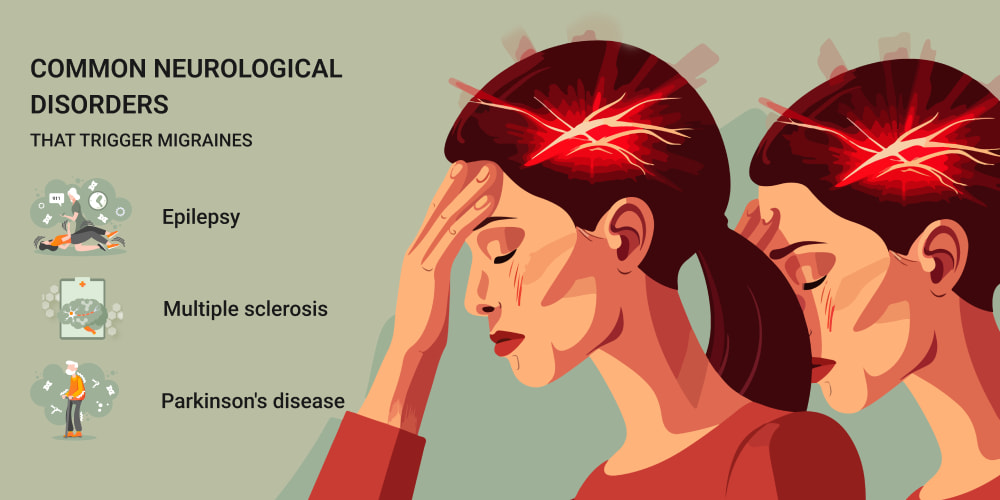Everyone sometimes experiences a headache that prevents them from living a normal life. Neurological health plays a key role in a good life and emotional well-being. Severe headache is the biggest trigger that interferes with daily activities. Often, people experience pain, such as migraines, which are very dangerous. A person may have poor vision and feel nausea and constant throbbing pain. A neurological condition often triggers migraines and their development. A person who has other diseases often experiences migraines.
Constant stress, fatigue, and exhaustion lead to the appearance of pain. A person who has suffered a stroke or has inflammation in the nervous system is severely affected by migraines. Understanding how dangerous it is, early intervention is mandatory. Neurological disorders can aggravate this condition, and treatment is required. Lifestyle changes, prevention, and diagnosis are essential. Doctors will help you figure out common and underlying triggers and treat your condition.
The Connection Between Migraines and Brain Health
Brain health plays a key role in our lives. A healthy brain provides us with the body’s functions and the quality of life. Migraine is closely connected to the brain and causes harm to it. Neurological problems cause us to experience pain and constant pain. The brain is responsible for cognitive functions for our memory and mind. Migraines disrupt the health of the entire body and brain and interfere with everyday life. Here’s how it affects the brain:
- Short-term effect. A person has unpleasant sensations associated with inflammation and changes in blood flow. These problems affect our brains and can lead to severe pain. Often, people experience vision problems and feel dizzy and nauseous. Another problem that is classified as a neurological disorder is migraine.
- Long-term effect. Chronic headaches, such as migraines, lead to significant losses. Migraine contributes to the damage of the white matter, which affects cognitive functions. It has an impact on the brain and its parts that affect memory and decision-making. Usually, a person who suffers from migraines can sometimes get a stroke, dementia, or epilepsy.
Neurological problems pose a high threat to the brain and its full functioning. Adverse conditions can include chronic inflammation and nerve dysfunction, which aggravates the headache. It is essential to understand that epilepsy and migraine have similar activity and cause pain. Often, inflammation causes this disease and aggravates vascular damage. LoneStarNeurology cares about a person’s mental and neurological condition. We offer you treatment that will help solve serious problems.
Common Neurological Disorders That Trigger Migraines
Neurological disorders and their long-term effects cause headaches. Migraine is often a direct symptom of these diseases or is a trigger. The disorders may include neurotransmitter imbalances and vascular dysfunction, which is dangerous. Certain conditions influence the onset of this disease and pose a significant risk to a person. Understanding what exactly can happen and how to deal with it is critical for understanding and treatment. Here are the common neurological disorders that are associated with the occurrence of headaches:
- Epilepsy. Migraines and epilepsy lead to sensory disorders and pain. They provoke specific abnormal activity in the brain. Known triggers can be seizures due to high nervous excitability. Also, inflammation in the brain and a decrease in the seizure threshold in patients with epilepsy are provoked.
- Multiple sclerosis. Multiple sclerosis can often involve various chronic inflammations in the human body. They can disrupt the standard transmission of signals to the brain. As a result, a person suffers from migraine triggers and is prone to this disease. A person with multiple sclerosis often suffers from blood vessel abnormalities.
- Parkinson’s disease. Parkinson’s disease is strongly linked to low levels of dopamine in the human body. The disruption of this hormone can provoke conditions like migraines. This disease is accompanied by a lack of oxygen in the brain. The brain does not receive all the necessary nutrients and loses the ability to perform certain functions.
How Chronic Pain from Migraines Affects the Nervous System
Migraine often creates chronic pain that prevents a person from living a full life. It can last for days, months, or even longer. The chronic condition causes repetitive pain and affects the person’s nervous state. Inflammation, changes in brain activity, and sensory disturbances are the result of this condition. This is how migraines affect the nervous system:
- There is increased activity in the nervous system and hypersensitivity to pain. People can feel any discomfort, even with light touch or light and sound.
- Often, during a migraine, a person has irregular levels of hormones that affect the body. A person suffers from hypersensitivity to pain and constant hyperexcitability.
- The chronic condition has a significant impact on long-term neuroinflammation. It leads to disruption of nerve pathways and extensive changes in the brain.
Neurological disorders aggravate migraine pain and often have their consequences. A person who has epilepsy, Parkinson’s disease, or nervous dysfunction has a lot of pain. Certain conditions interact with migraine pain and increase a person’s discomfort.
Very often, migraine triggers have a long-term impact on our brains. They lead to adverse conditions such as cognitive impairment. A person often has memory problems and difficulty concentrating. The long-term effect is also an increased risk of certain diseases such as stroke. Migraine causes narrowing of blood vessels and blood clots in the long term. Mental health is also an integral part of its impact. A person experiences constant pain that is associated with anxiety, depression, and mood disorders.
Migraine Triggers and Their Connection to Neurological Conditions
Migraine is often associated with a variety of external and internal triggers. Migraine triggers can affect a person and their subconscious and cause the disease. Triggers can be different and are vary in how they affect people. The neurological state of a person can change and become worse as a result of the adverse effects of triggers. Here are the main triggers:
- Stress. Stress causes negative emotions and muscle tension in a person. It often has a neurological connection and exacerbates such problems and diseases as epilepsy and multiple sclerosis. One of the migraine triggers is stress on a regular basis. Stress can cause further inflammation, which leads to migraines.
- Hormonal changes. Quite often, people with migraines suffer from hormonal changes. Pregnancy, menopause, or fluctuations in estrogen levels lead to this condition. Diseases such as epilepsy or Parkinson’s disease can include hormonal imbalances. Hormonal changes are migraine triggers and can cause further inflammation and problems.
- Environmental factors. Very often, bright light, loud sounds, and smells can overstimulate specific sensory processes in the brain. Long-term exposure causes inflammation and headaches. Traumatic brain injuries have increased sensory activity and cause migraines.
Neurological disorders can create significant problems in the long run. Responding quickly to migraines and hypersensitivity is essential. Consult a doctor and choose high-quality, reliable treatment methods. We will help you treat the condition effectively.
The Role of Genetics in Migraines and Neurological Disorders
Genetics has a powerful influence on our health and well-being. It plays a major role in the onset of migraine and neurological disorders. Many experiments and studies have proven that family history is a priority. It is the significant factor in migraine occurrence. Genetics has a great influence on the brain and its function. Here is the main information about the connection with genetics:
- It has been scientifically proven that over 50% of people who have migraines have a close family member with the same disease. Specific gene mutations lead to this condition. There are also familial gene patterns that cause migraines.
- It is scientifically proven that most neurological disorders have a strong connection with genetics. People who have Parkinson’s or epilepsy have close relatives with the same disease. Certain genetic factors have an impact on the immune system. This can lead to nerve damage, chronic pain, and inflammation.
- Brain health is crucial in our lives for normal functioning. Genetic mutations can change its structure and function. They affect the onset of stress, hormonal changes, and sensory stimuli. A family history of neurological disorders is beneficial for understanding the problem in a person. It can indicate a vulnerability to certain brain inflammations and vascular issues. It is important to understand that brain health is the most important thing, and the doctor will help preserve it.
Effective Strategies for Managing Migraines in People with Neurological Disorders
Chronic pain can cause significant discomfort to a person with migraines. Effective methods of treatment will help to get rid of this condition. You can maintain a better quality of life without feeling pain. Here are the key and effective methods:
- People with neurological disorders can cope with migraines by familiarizing themselves with the triggers. Remember to keep a diary and write down specific triggers and avoid bright lights, smells, and sounds.
- Always follow a healthy sleep routine and control your sleep. Fall asleep in a cool room without using TVs and cell phones.
- Change your lifestyle and add more physical activity. A light walk and strength training will help you cope with stress. Do not forget to meditate and relax with aromatherapy.
- To avoid migraine triggers, always take care of your diet. Eat foods high in healthy fats and vitamins. Try to drink water more often and take care of your blood sugar.
- For a good solution to the problem, you can consult a doctor. They will help you examine the issue and prescribe the appropriate treatment process and method.













Please, leave your review
Write a comment: